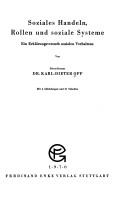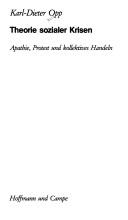| Listing 1 - 10 of 37 | << page >> |
Sort by
|
Book
ISBN: 9780415483896 9780415483889 9780203883846 0415483883 0415483891 0203883845 9781134014347 9781134014385 9781134014392 Year: 2009 Publisher: London Routledge, Taylor & Francis Group
Abstract | Keywords | Export | Availability | Bookmark
 Loading...
Loading...Choose an application
- Reference Manager
- EndNote
- RefWorks (Direct export to RefWorks)
Sociological theory building --- Community organization --- Opposition (Political science) --- Protest movements. --- #SBIB:324H73 --- #SBIB:324H74 --- Political opposition --- Political science --- Divided government --- Social movements --- Politieke verandering: oppositie en minderheid, protest, politiek geweld --- Politieke verandering: sociale bewegingen --- Opposition (Political science). --- Protest movements

ISBN: 3432016484 Year: 1970 Publisher: Stuttgart Enke
Abstract | Keywords | Export | Availability | Bookmark
 Loading...
Loading...Choose an application
- Reference Manager
- EndNote
- RefWorks (Direct export to RefWorks)
Sociological theories --- 316.66 --- Social action --- Social role --- #SBIB:316.21H22 --- Role, Social --- Social psychology --- Social status --- Social policy --- Social problems --- Rolgedrag. Sociale status. Sociale rol --- Theoretische sociologie: neo-Marxisten --- Social action. --- Social role. --- 316.66 Rolgedrag. Sociale status. Sociale rol --- Role (Sociology)
Book
ISBN: 3499210193 Year: 1972 Publisher: Reinbek Rowohlt
Abstract | Keywords | Export | Availability | Bookmark
 Loading...
Loading...Choose an application
- Reference Manager
- EndNote
- RefWorks (Direct export to RefWorks)

ISBN: 3169446703 Year: 1983 Publisher: Tübingen Mohr Siebeck
Abstract | Keywords | Export | Availability | Bookmark
 Loading...
Loading...Choose an application
- Reference Manager
- EndNote
- RefWorks (Direct export to RefWorks)
#SBIB:316.7C123 --- 316.75 --- Social norms --- 316.754 --- #SBIB:316.21H60 --- Folkways --- Norms, Social --- Rules, Social --- Social rules --- Manners and customs --- Social control --- Cultuursociologie: sociale normen --- Kennissociologie. Ideologie --- Sociale normen --(sociologie) --- Fenomenologische sociologie --- Social norms. --- 316.754 Sociale normen --(sociologie) --- 316.75 Kennissociologie. Ideologie
Book
ISBN: 3499553392 Year: 1970 Publisher: Reinbek bei Hamburg : Rowohlt Taschenbuch Verlag,
Abstract | Keywords | Export | Availability | Bookmark
 Loading...
Loading...Choose an application
- Reference Manager
- EndNote
- RefWorks (Direct export to RefWorks)
Sociological theory building --- Social sciences --- Methodology. --- Methodology
Book
ISBN: 9780367086664 9780429026980 0429026986 9780429648823 0429648820 9780429651465 0429651465 9780429646188 0429646186 Year: 2020 Publisher: London ; New York : Routledge,
Abstract | Keywords | Export | Availability | Bookmark
 Loading...
Loading...Choose an application
- Reference Manager
- EndNote
- RefWorks (Direct export to RefWorks)
"There are more than twenty theories that explain crime. Each theory has weaknesses, and no scholar knows which theory is best. To remedy this unsatisfactory situation a new research program of comparative theory testing is proposed. Comparing the theories with each other has not yet been successful. The alternative, suggested in this book, is to show how criminological theories must be modified if they are compared with a general behavioral theory. The book shows for the major criminological theories under which conditions they provide valid explanations of crime. The latter thus become integrated as parts of the general theory. The general theory that is chosen is a version of the theory of rational action. This is not the problematic version discussed in the literature, but states the real conditions of decision making and, thus, explains when people actually violate the law or remain law-abiding. The general theory is a component of a theoretical approach that explains individual behavior in interaction with societal (macro) conditions. This micro-macro approach is summarized in a proposed structural-cognitive model. This is part of the new program of Analytical Criminology. It suggests empirical theory comparison, process explanations and micro-macro explanations. The book is not only written for readers who are interested in theories of crime and deviant behavior. It is also a treatise in "analytical" (i.e. rigorous) theory construction and empirical theory comparison"--
Criminology. --- Deviant behavior. --- Criminologie --- Déviance --- Crime --- Criminalité --- Critical criminology --- Criminologie critique
Book
ISBN: 3432905114 Year: 1979 Publisher: Stuttgart Enke
Abstract | Keywords | Export | Availability | Bookmark
 Loading...
Loading...Choose an application
- Reference Manager
- EndNote
- RefWorks (Direct export to RefWorks)
Social sciences --- #SBIB:316.21H22 --- #SBIB:316.23H3 --- Behavioral sciences --- Human sciences --- Sciences, Social --- Social science --- Social studies --- Theoretische sociologie: neo-Marxisten --- Wijsgerige grondslagen en discussie in de sociologie --- Sociological theories --- Civilization
Book
Year: 1974 Publisher: Darmstadt: Neuwied,
Abstract | Keywords | Export | Availability | Bookmark
 Loading...
Loading...Choose an application
- Reference Manager
- EndNote
- RefWorks (Direct export to RefWorks)

ISBN: 3455092268 Year: 1978 Publisher: Hamburg Hoffmann und Campe
Abstract | Keywords | Export | Availability | Bookmark
 Loading...
Loading...Choose an application
- Reference Manager
- EndNote
- RefWorks (Direct export to RefWorks)
Book
Year: 1975 Publisher: München Beck
Abstract | Keywords | Export | Availability | Bookmark
 Loading...
Loading...Choose an application
- Reference Manager
- EndNote
- RefWorks (Direct export to RefWorks)
| Listing 1 - 10 of 37 | << page >> |
Sort by
|

 Search
Search Feedback
Feedback About UniCat
About UniCat  Help
Help News
News